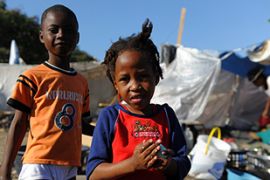Children missing in Haiti aftermath
Unicef adviser says about 15 disappearances documented, prompting trafficking fears.

In the aftermath of the earthquake, trafficking networks are thought to have tried to take advantage of the weakness of local authorities and relief co-ordination.
Rupert Colville, a spokesman for the office of the UN High Commissioner for Human Rights, said that child enslavement and trafficking in Haiti “could easily emerge as a serious issue over the coming weeks and months”.
Adoption worries
Children, many of whom have lost parents, have been particularly vulnerable following the earthquake.
| special report | |
|
Al Jazeera’s Zeina Khodr, reporting from a makeshift orphanage in the capital, Port-au-Prince, said many children at the facility had been left traumatised by the disaster.
One nine-year-old boy at the orphanage had lost both his parents and could not be sure his sister had survived.
“Somebody brought him here and he later found out that his parents had died. He is traumatised and doesn’t know if his sister is dead or alive,” Khodr said.
“There are many stories like his in Haiti, which brings up the challenge of reuniting families and it’s not going to be easy.”
Several countries, including Belgium, Canada, France, Germany, the Netherlands, Spain and the United States, are fast-tracking adoption procedures.
But Unicef has warned countries over the past week not to increase efforts for adoption from Haiti in the immediate wake of the quake.
“Haitian officials who are in charge of orphanages are worried that if organisations are rushing to grab these children, put them on planes and send them off for adoption, they need to make sure that their parents aren’t alive first,” Khodr said.
‘Permanent alternatives’
Ann Veneman, Unicef’s executive director, said that “every effort” would be made “to reunite children with their families”.
“Only if that proves impossible, and after proper screening has been carried out, should permanent alternatives like adoption be considered by the relevant authorities,” she said.
Prior to the earthquake, Haiti had grappled with the problem of trafficking children abroad.
Unicef adviser Legrand said: “We have seen over the last years many children being taken out of the country without any legal procedure.
“This is going on, this is happening now, and we are starting to have the first evidence of that, this is unquestionable”.
Michele Pierre-Louis, the prime minister of Haiti, assured Unicef on Thursday that the children who left the country in the previous days were legal adoptions, whose files had received due authorisation prior to the earthquake.
He said that a total of 140 children legally departed, 100 to The Netherlands and 40 to France, all of them verified by his office.
